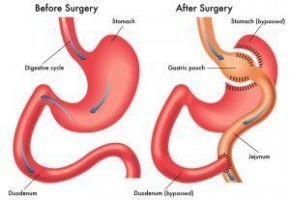- Home
- Editorial
- News
- Practice Guidelines
- Anesthesiology Guidelines
- Cancer Guidelines
- Cardiac Sciences Guidelines
- Critical Care Guidelines
- Dentistry Guidelines
- Dermatology Guidelines
- Diabetes and Endo Guidelines
- Diagnostics Guidelines
- ENT Guidelines
- Featured Practice Guidelines
- Gastroenterology Guidelines
- Geriatrics Guidelines
- Medicine Guidelines
- Nephrology Guidelines
- Neurosciences Guidelines
- Obs and Gynae Guidelines
- Ophthalmology Guidelines
- Orthopaedics Guidelines
- Paediatrics Guidelines
- Psychiatry Guidelines
- Pulmonology Guidelines
- Radiology Guidelines
- Surgery Guidelines
- Urology Guidelines
Gastric bypass as good as sleeve gastrectomy in Morbid obesity: JAMA

In Switzerland, 5,500 operations to combat morbid obesity are conducted every year. Gastric bypasses and sleeve gastrectomy operations perform similarly: patients lose two-thirds of their excess weight in the long term, as researchers from the University of Basel at the St. Claraspital report in the Journal of the American Medical Association (JAMA). When it comes to gastric acid reflux, the bypass clearly shows better results.
Morbid obesity and associated diseases such as diabetes, cardiovascular diseases, and cancer are widespread in the western world. Surgical interventions are currently considered to be the most effective measure in severely obese people with a BMI over 35.
The standard surgery is a gastric bypass, where part of the stomach and small intestine is bypassed. Other methods are also becoming more popular, such as sleeve gastrectomy, in which the volume of the stomach is reduced. This operation is technically easier to perform and can be done with low complication rate even in patients with very high BMI.
More than 200 patients examined
To compare these two common types of surgery, the study looked at 217 morbidly obese patients; half were assigned to a gastric bypass and half a sleeve gastrectomy. Their average age was 45.5 years, and 72% of them were women. The study was conducted at four locations in Switzerland and was led by Professor Ralph Peterli from the University of Basel at St. Claraspital.
In terms of weight loss, the two types of surgery led to similar results five years after the surgery: the patients lost 68% of their excess weight after a gastric bypass, and 61% after a sleeve gastrectomy. The BMI also fell from 44 to 32 after both operations. Associated diseases such as hypertension, diabetes, altered blood lipids, back/joint pain and depression were also improved, as well as general quality of life.
Improvement in gastric acid reflux
Patients with existing gastric acid reflux benefited more from a gastric bypass operation: after this procedure, symptoms were eliminated in 60%, compared to only 25% after a sleeve gastrectomy. Sleeve gastrectomy also led to a deterioration or new onset of gastric acid reflux significantly more often. Further surgery or interventions were needed in 22% of gastric bypasses and 16% of sleeve gastrectomy operations.
To read the full article click on the link http://dx.doi.org/10.1001/jama.2017.20897

Disclaimer: This site is primarily intended for healthcare professionals. Any content/information on this website does not replace the advice of medical and/or health professionals and should not be construed as medical/diagnostic advice/endorsement or prescription. Use of this site is subject to our terms of use, privacy policy, advertisement policy. © 2020 Minerva Medical Treatment Pvt Ltd